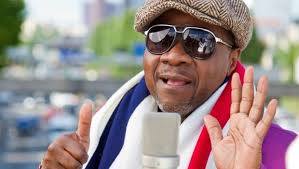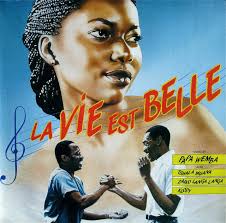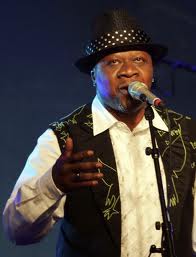
In high school, while on our way to school, my father would play Papa Wemba‘s album in the car: Emotion. Rightfully titled ‘Emotion‘, Wemba’s album featured a whole range of emotions which added to his unique ‘Rooster-like‘ voice to make me, as a teenager, feel those emotions, and go to school happy. Try it… listen to the up-beat Yolele, or Fafafa-fa, Sala Keba, or Awa Y’ Okeyi, … and tell me how you feel, truly, because Papa Wemba rocked my childhood.

So when I learnt that this great man, Papa Wemba, the one who had accompanied me with his voice to school every day, this man who had made me so proud of music, Congolese music, African music, this flamboyant stylish man who had introduced the world to SAPE, the King of Congolese Rumba, this man whose words I still quote “Y a pas match, Kaokokokorobo” had collapsed on stage and was no longer… I was devastated. Oh Papa Wemba, I thought you were going to ride with my kids to school, the way you did with me…. I thought I would always dance to the rhythm of O’Koningana,…Ye te oh, Wake Up, …
When life was hard, I would hum to the tune of your song in the movie ” La Vie est Belle” and instantly life became beautiful again. And ‘Mama‘ was just a loving song to a mother. When I felt lost, I would sing “Show me the way.”

Yes… Papa Wemba was truly a genius. He was born Shungu Wembadio Pene Kikumba in June 1949 in Lubefu, in the Democratic Republic of Congo. His love of music can be attributed to his mother, who was a professional “wailing woman” at funerals. Mixing traditional African music with Western rock, he and his successive bands – Zaiko Langa Langa, Isifi Lokole, Yoka Lokole, and Viva la Musica – enjoyed hit after hit, including L’Esclave, Maria Valencia, Analengo, and Le Voyageur. He shaped Congolese music in the 1970s -90s, he made Soukous the most popular sound across Africa, and attracted international music figures like Peter Gabriel. I am not sure if there is a great African star he had not sung or collaborated with: from Brenda Fassie, Tabu Ley Rochereau, Pepe Kalle, Lokua Kanza, Barbara Kanam, Manu Dibango, Koffi Olomidé, Bisso Na Bisso, JB Mpiana, Angélique Kidjo, Salif Keïta, Alpha Blondy, Singuila, to Youssou N’dour, and countless others. He also collaborated with the great diva Aretha Franklin. He was a talented man, and he also sought to reveal young talents. He loved to share his gift, his voice, with all.

So I was sad… But then I realized that Papa Wemba had trained generations of musicians, had inspired numerous people, sang his lungs out for so many of us… then I realized that his flamboyant spirit lives on. His music keeps on… The dress style he created, la SAPE, still goes on. And yes, I will keep playing Yolele. So is Papa Wemba really gone? Is this great African baobab really gone? No, he has just changed his postal address. However, his music stays with us, and will lead some of us to school or work… always.

